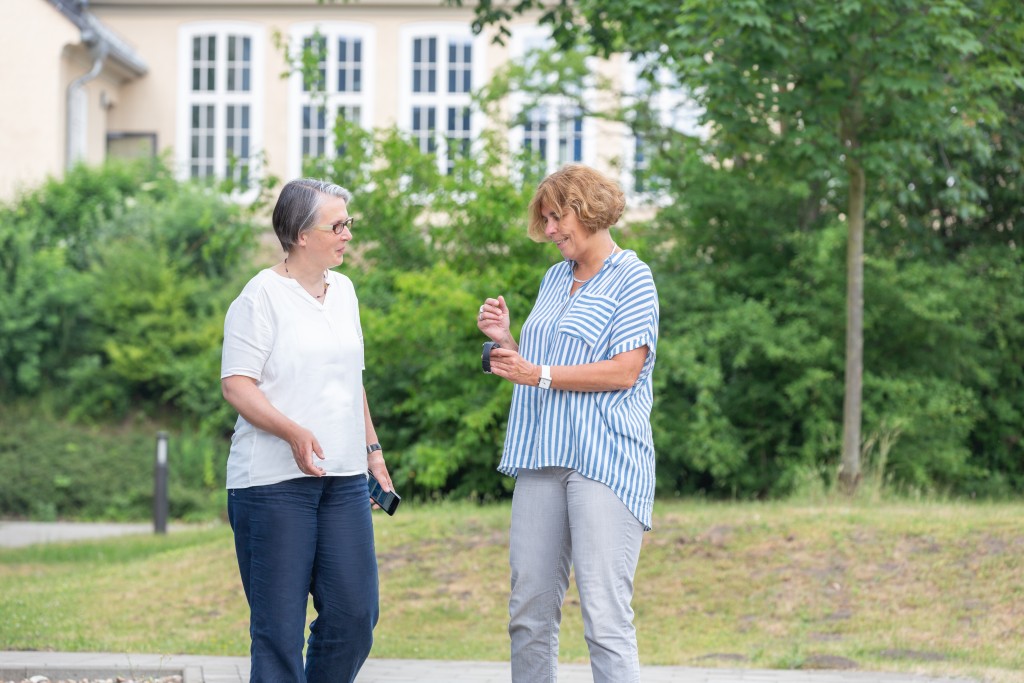They come from different areas but nevertheless have much in common: the professors Sandra
Verena Müller (faculty of Social Work), Ina Schiering (Computer Science) and Martina Hasseler
(Public Health Services). In the interview the three are talking about what unites them, what the
goal of the research area Research on Societal Participation and Health Services Research is - and
why their research is so important, especially right now.
Public Health Services, Social Work, Computer Science and Electrical Engineering – in the
research area Research on Societal Participation and Health Services Research, these four Ostfalia
faculties are working hand in hand. Why remove the borders between these subjects?
Martina Hasseler: Because that's the only way to arrive at new ideas.
We are working on technical and social solutions in order to improve services in the healthcare
system and the participation of "vulnerable" people, as we say in scientific fields. We'll manage
this only if we are surrounded by researchers who think differently to us.
Ina Schiering: We are part of a generational change. The university
fulfils a different role today than it did just a few years ago. Many social problems can only be
dealt with if we remove any blinkers and work in an interdisciplinary manner.
Many technicians and engineers, computer scientists and electrical engineers are working under
your "research roof". What are the reasons for this?
Ina Schiering: Progressive digitization and the triumph of the
smartphone. The technical applications offer us a lot of potential in the area of Research on
Societal Participation and Health Services Research. To give one simple example: Using
smartwatches, we can help people with executive function disorders, i.e. with task and activity
planning, not to lose sight of their day-to-day goals. This is achieved by the watch telling
them to do their shopping or to take the next bus.
What connects you three and your research colleagues?
Sandra Verena Müller: Our common objective. We want more people to
participate in society: by autonomously organising their everyday life, holding down a job, or
taking part in cultural life. Our target groups are very diverse, e.g. stroke, tumour and traumatic
brain-injury patients, and people with intellectual disabilities.
Tell us about one of your projects.
Sandra Verena Müller: We have developed – for the first time in
Germany – a method for the early detection and diagnosis of Alzheimer's disease for people with
intellectual disabilities. Knowledge of dementia or of a suspected case enables the sufferer and
their families, as well as the employees of the institutions in which they live, to adapt to the
situation and therefore get appropriate treatment for the person affected.
You are researching with people, for people. What does this mean for your work?
Ina Schiering: As a computer scientist, IT security and data
protection are my speciality. In Germany, individuals have the fundamental right to determine for
themselves what information about them is used, and how. This means that people decide for
themselves what happens to their personal data. Because we work with sensitive information that
cannot be disclosed externally, it is my responsibility to strengthen people's rights – for
example, by working with data sparingly, or by anonymising or pseudo-anonymising data.
Sandra Verena Müller: The Senate Commission on Research Ethics, which
I chair, inspects all research requests to check whether they correspond to the ethical criteria:
whether the participants in the study are properly informed of their rights, what data is collected
and how it is subsequently processed. If the application does not meet the criteria, we subject it
to additional requirements.
Martina Hasseler: We work with people who are particularly vulnerable
due to their physical and mental condition. This makes it all the more important that we plan the
research in a well thought-out manner.
Why is your research currently so important?
Martina Hasseler: More and more people in the area of healthcare and
nursing are experiencing poor levels of quality. Why? A shortage of skilled workers. The fact that
the shortage in the long-term care sector is not just a concept, but in fact a reality, can only be
determined by our studies. We conduct applied research and want our projects to contribute to
better healthcare.
Is your research changing society?
Martina Hasseler: We take societal trends into account in order to
change society, in an ideal scenario.
Sandra Verena Müller: We anticipate changes and respond to them. We
are faced with many challenges – from demographic change to migration. We are dealing now with how
we want to live in twenty years' time.
Why is Ostfalia a good place for research?
Sandra Verena Müller: Because Ostfalia is very research
friendly...
Martina Hasseler: … and my university brings me together with
colleagues from other faculties.
Ina Schiering: Interdisciplinarity is the key to our success.
Last, but not least: Could you say in one sentence what it is about your work that makes it
fun?
Sandra Verena Müller: Because every day I tackle important social
issues and gain knowledge that benefits people.
Ina Schiering: Because I can help people exercise their right to
informational self-determination – and because, in a university environment, I get to work with
many young and interesting people.
Martina Hasseler: My motivation is to expand on knowledge in my area
of expertise, and at the same time improve healthcare.


